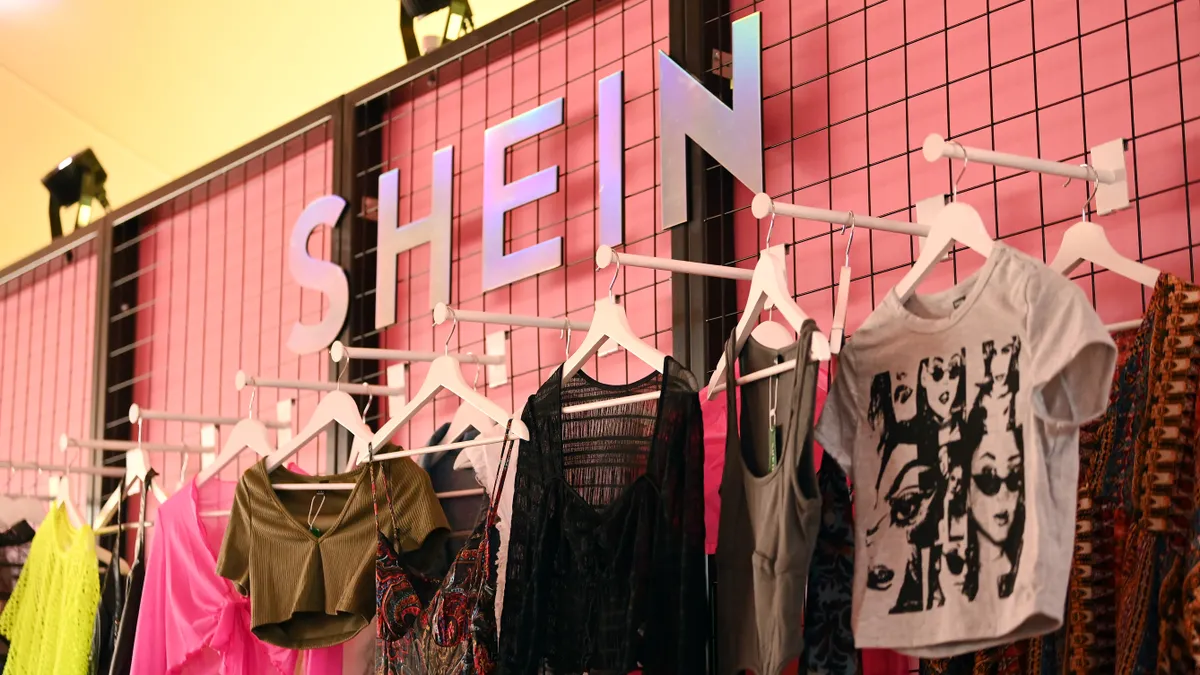Last week marked the second time this year China-based fast fashion house Temu sued rival Shein over allegations that the latter has tried to monopolize the industry’s supply chain.
After dropping a civil antitrust lawsuit against Shein it filed earlier this year, Temu sued Shein again under U.S. antitrust law last week, alleging this time that “Temu has discovered that Shein’s anticompetitive behavior has not only persisted but intensified.” This time, Temu accused Shein of “mafia-style” tactics, including intimidation of merchants in the space.
The words “supplier” or “suppliers” comes up more than 350 times in the lawsuit as it details allegations that Shein has tried to lock up the supplier base for itself and intimidate those who work with Temu as well — all as part of “a multi-faceted scheme to slow Temu’s growth in the United States.”
In a response to Supply Chain Dive’s questions about the allegations, a Shein spokesperson said, “We believe this lawsuit is without merit and we will vigorously defend ourselves.”
Here’s a look at Temu’s supply chain-related claims against its rival:
‘Glorified label maker’
Temu asserts that Shein is reliant on a small number of factories with “highly manual production processes, and tens of thousands of experienced workers, to handle the small batch sizes of Shein’s large volume of orders.”
In Temu’s words, “Shein’s business model depends on controlling these factories (through the various means alleged herein), rather than relying on Shein’s own in-house designs and production technology.”
This was meant to contradict many of Shein’s running explanations of its business as it courts the U.S. market. For its part, Shein says in its sustainability report that it sources products and materials from an “extensive network” of third-party suppliers worldwide. It says on its website that it uses “on-demand manufacturing technology to connect suppliers to our agile supply chain.”
Those technologies help it offer consumers choice without worrying about inventory waste. As the company says, “By developing proprietary logistics and ecommerce technology, we are disrupting the fashion space and improving outcomes for manufacturers, suppliers and consumers.”
Temu alleged that Shein’s touting of technology and design are “stagecraft,” and that “Shein’s business model is based on copying trendy designs, using its network of thousands of captive suppliers to manufacture copies of those designs, and reselling the copy with a Shein label attached.”
“Shein is not a brand; it is a glorified label maker,” Temu claimed.
‘Detaining’ suppliers
One of the core claims in Temu’s lawsuit is around what it calls Shein’s “anticompetitive scheme to block Temu’s access to the specialized suppliers necessary to compete in the market.” Elsewhere, Temu complains that Shein has blocked its access to 70% to 80% of ultra-fast fashion suppliers.
Perhaps the company’s most incendiary allegation was that Shein has physically detained suppliers it believed sold products to Temu.
The allegation centers on “an ongoing program” that, in the words of the complaint, consists of:
- Summoning Temu’s suppliers on false pretenses to Shein’s offices.
- Detaining those suppliers’ representatives in Shein’s office for up to 10 hours.
- Seizing these Temu sellers’ phones, searching their phones for Temu sales, commercial and other financial information without permission.
- Demanding the sellers’ chat histories and log-in credentials for their Temu account.
- Compelling them to sign documents against their will, and threatening them with extensive penalties and termination of their Shein contracts for selling on Temu.
Temu repeated the accusation multiple times in its complaint, noting at one point the “unknown scope” of the alleged detentions. Along with the obvious harm such actions would have on merchants, it would also give a rival access to “a treasure trove of Temu’s trade secret information” once log-in credentials were obtained to Temu’s supplier portal, the company said.
Exclusive agreements
A less dramatic way of controlling suppliers is through exclusive-dealing agreements that Temu said are anticompetitive.
Temu alleged that Shein, using these agreements, “improperly seizes suppliers’ IP rights — without due consideration and, oftentimes, without suppliers’ knowledge — to prevent suppliers from listing and selling similar products on Temu or other retail platform.”
Shein, according to Temu, then uses those IP rights to file notices under the Digital Millennium Copyright Act in the U.S., “seeking to shut down competing product listings by merchants who dare to list their products on Temu.”
Temu argues that the agreements are not valid, and that in many cases the suppliers don’t own the rights to transfer over to Shein.























